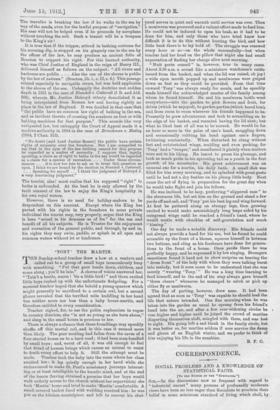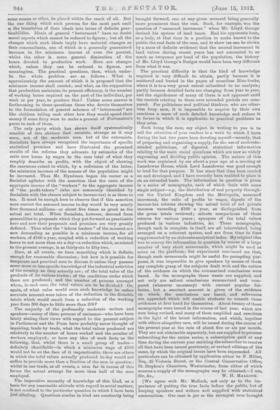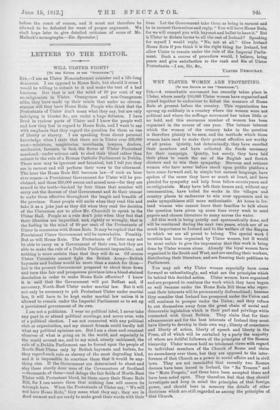CORRESPONDENCE.
SOCIAL PROBLEMS AND A KNOWLEDGE OF STATISTICAL FACTS.
[To mu EDITOIL OP TH/1 " SPECTATOP.1
Srn,—In the discussions now so frequent with regard to " industrial unrest" many persons of professedly moderate views have been no less eager than Socialists to proclaim their belief in some minimum standard of living which shall, by
some means or other, be placed within the reach of all. But the one thing which such persons for the most part omit is the translation of their ideals into terms of definite pram- ticabilities. Ideals of general "betterment" have no doubt moral aspects which cannot be reduced to figures ; but all the changes which such ideals imply have material changes as their concomitants, one of which is a generally guaranteed increase in the minimum income of even the poorest, whilst the other is some general diminution of the hours devoted to productive work. Here are changes which, unless they can be reduced to figures, are meaningless. The practical questions, then, which under- lie the whole problem are as follows ; What is approximately the amount of which it is proposed that the minimum income shall consist; and what, on the supposition that production maintains its present efficiency, is the number of working hours required on the part of the individual, per week or per year, to produce this P Unless some answer is forthcoming to these questions those who devote themselves to the formulation of general schemes of "betterment" are like children telling each other how they would spend their money if some fairy were to make a present of Fortunatus's purse to each of them.
The only party which has shown itself systematically sensible of this obvious fact consists, strange as it may seem, not of the moderate men, but of the extremists. Socialists have always recognized the importance of specific statistical promises and have illustrated the promised results of the reforms they advocate by estimates of the ratio now borne by wages to the sum total of what they roughly describe as profits, with the object of showing the enormous extent to which, by a rediviaion of the latter, the minimum incomes of the masses of the population might be increased. Thus Mr. Hyndman began his career as a Socialist agitator with the assertion that the ratio of the aggregate income of the " workers " to the aggregate income of "the profit-takers" (who are commonly identified by Socialists with the classes subject to income-tax) is as three to ten. It must be enough here to observe that if this assertion were correct the assessed income to-day would be very nearly four thousand millions—or about five times as great as the actual net total. When Socialists, however, descend from generalities to proposals which they put forward as practicable here and now their proposals and promisee are very greatly deflated. Thus what the " labour leaders " of the moment are now demanding as possible is a minimum income, for all workers, of £100 a year, coupled with a reduction of working hours to not more than six a day—a reduction which, as related to the present average, is as thirty-six to fifty-two.
Here, at all events, we have something which is definite enough for reasonable discussion ; but how is it possible for temperate and practical men to discuss it unless they possess some more or less specific knowledge of the industrial activities of the country as they actually are ; of the total value of the products of its various trades ; of the conditions under which these are produced; and the number of persons amongst whom, in each case, the total values are to be divided P Or, again, of what value would even such knowledge be unless accurate account were taken of the reduction in the divisible totals which would result from a reduction of the working year from 300 days to little more than 200P
The majority of the professedly moderate writers and speakers—many of them persons of eminence—who have been lately stating their views with regard to the present subject in Parliament and the Press have probably never thought of inquiring, trade by trade, what the total values produced are relatively to the number of hours worked and the number of workers employed ; or have any idea of such facts as the following, that, whilst there is a small group of trades— definitely identifiable—in which a minimum wage of £100 would not be on the face of it impracticable, there are others in which the total values actually produced to-day would not suffice to provide more than a fraction of the sum in question ; whilst in one trade, at all events, a sum far in excess of this forme the actual average for more than half of the men employed.
The imperative necessity of knowledge of this kind, as a basis for any reasonable attitude with regard to social matters, is not confined to the particular question to which I have been just alluding. Questions similar in kind are constantly being brought forward, one at any given moment being generally more prominent than the rest. Such, for example, was the question of " unearned increment. " when Mr. Lloyd George devised his system of land taxes. Had his opponents been, as a body, at that time in a position to make known to the public the real facts of the case, and to show (as can be shown by a mass of definite evidence) that the annual increment in land values during recent years has not amounted to so much as twopence per head of the population, the history of Mr. Lloyd George's Budget would have been very different from what it was.
The practical difficulty is that the kind of knowledge required is very difficult to obtain, partly because it is scattered and buried in the pages of countless Blue-books, where it is to a very great extent submitted to no analysis; partly because detailed facts are changing from year to year, and the significance of many of them is not apparent until the records relating to them over extended periods are com- pared. For politicians and political thinkers, who are other- wise busy men, it is impossible to acquire by their own exertions a mass of such detailed knowledge and reduce it to forma in which it is applicable to practical problems as they arise.
Such being the case, my object in writing to you is to call the attention of your readers to a work to which I have during the last two years been devoting myself—namely, that of preparing and organizing a supply, for the use of moderate• minded politicians, of digested statistical information relating to the main social questions which are now so widely engrossing and dividing public opinion. The nature of this work was explained by me about a. year ago at a meeting at Lansdowne House, which Lord Lansdowne was good enough to lend for that purpose. It has since that time been carried on and developed, and I have recently been enabled to place it on an extended basis. The information in question is given in it series of monographs, each of which deals with some single subject—e.g., the distribution of real property through- out the United Kingdom and the Metropolis, unearned increment, the ratio of profits to wages, digests of the income-tax returns showing the actual total of net private incomes exceeding £160 a year, as distinguished from. the gross totals reviewed ; minute comparisons of these returns for various years ; synopses of the total values produced in various industries, &c. These monographs, though each is complete in itself, are all interrelated, being arranged on a coherent system, and are from time to time supplemented by an elaborate analytical index. My original idea was to convey the information in question by means of a large number of very short memoranda, which might be used as notes on the platform; but experiment convinced me that, though such memoranda might be useful for prompting pur- poses, it was impossible to give speakers by means of them any complete grasp of the subjects dealt with and the nature of the evidence on which the summarized conclusions were based. In the monographs these wants are supplied, and not only are salient conclusions summarized and com. pared (wherever necessary) with current popular fal- lacies, but a succinct account is given of the evidence on which the conclusions are based, and references are appended which will enable students to consult these evidences at first hand for themselves. About twenty of these monographs were issued in the course of last year, which are now being revised, and many of them amplified and rewritten in the light of the latest information, and which, together with others altogether new, will be issued during the course of the present year at the rate of about five or six per month. They are not obtainable separately, but are supplied to persons subscribing for the entire series, a subscription paid at any time during the current year entitling the subscriber to receive all that have been issued previously, or revised editions of the same, by which the original issues have been superseded. All particulars can be obtained by application either to F. Millar, Esq., 25 Victoria Street, or the Central Conservative Office, St. Stephen's Chambers, Westminster, from either of which sources a supply of the monographs may be obtained.—I am,
(We agree with Mr. Mallock, not only as to the im- portance of putting the true facts before the public, but of keeping speakers and writers well supplied with statistical ammunition. Our case is per ao the strongest ever brought before the court of reason, and it must not therefore be allowed to be defeated for want of proper argument. We shall hope later to give detailed criticism of some of Mr. Mallock's monographs.—En. Spectator:1












































 Previous page
Previous page